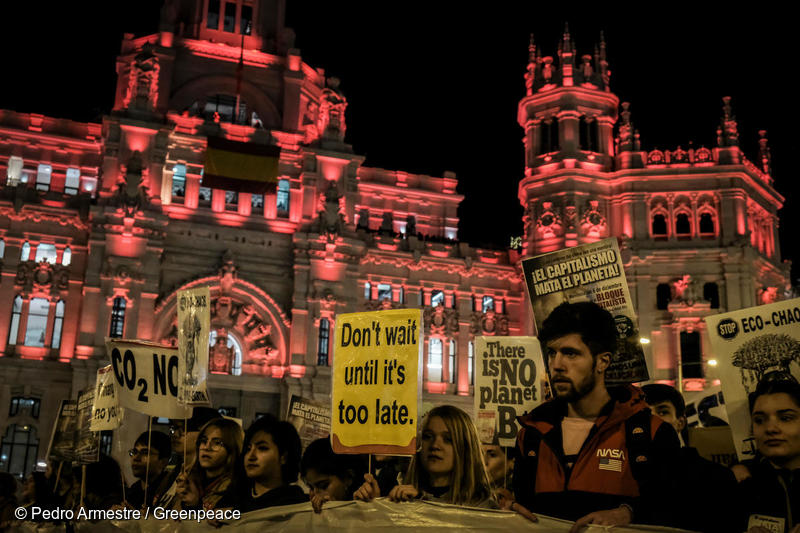Brussels, 1 April 2020 – The postponement of UN climate talks should have no impact on the EU’s commitments to tackle the climate emergency, warned Greenpeace. In the wake of the Covid-19 crisis, the UN today delayed the global climate conference in Glasgow (known as COP26) which was scheduled for November.
Greenpeace International Executive Director Jennifer Morgan said: “The Covid-19 response has to be resilient for our health and climate. The goal of governments now is to care for their citizens, stabilise and rebuild – and they must do so in a way that creates a just and climate-safe world, because environmental health and our own well-being are dependent on each other. COP26 being put on hold should make governments double down on their efforts to ensure a green and just way forward in handling this health crisis and the climate emergency. Going back to ‘business as usual’ is completely unacceptable: this pandemic shows there are huge lessons to be learned about the importance of listening to science and the need for urgent collective global action.”
Greenpeace EU climate policy adviser Sebastian Mang said: “The world is going through collective shock, which is particularly painful for the most vulnerable. Postponing UN climate talks is understandable. But this doesn’t change the EU’s obligation to raise its climate target for 2030 before the end of the year. Collective action based on science is needed whether COP26 convenes in Glasgow in November or not. EU leaders must keep their promises and take this moment to ensure public money goes to caring for people, building resilient communities and reducing emissions and other forms of pollution.”

The European Commission’s draft EU climate law includes no measures to boost emissions cuts by 2030, whilst the Commission proposal to increase the 2030 target has been delayed until September. Under the Paris climate agreement, governments must submit new or updated 2030 climate plans before the end of the year.
Cuts in greenhouse gas emissions over the next ten years are definitive for the success – or failure – of climate action, according to UN scientists. A recent UN report calculated that to restrict global heating to 1.5°C global emissions should be cut by an average of 7.6% a year. This means that the EU must commit to yearly reductions of at least 7.6% between 2020 and 2030, reaching just over a 65% cut in emissions by 2030, compared to 1990 levels. The longer governments wait to reduce emissions, the steeper and tougher these cuts will need to be.
For more information and analysis, please refer to our EU climate law media briefing.
Contacts:
Sebastian Mang – Greenpeace EU climate policy adviser: +32 (0)479 60 12 89, [email protected]
Greenpeace EU press desk: +32 (0)2 274 19 11, [email protected]
For breaking news and comment on EU affairs: www.twitter.com/GreenpeaceEU
Greenpeace is an independent global campaigning organisation that acts to change attitudes and behaviour, to protect and conserve the environment and to promote peace. Greenpeace does not accept donations from governments, the EU, businesses or political parties.
